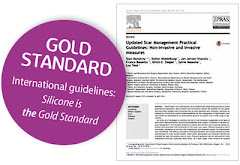Why? Let’s find out!
Research has shown that after an operation, there is a 50%
chance that a scar will become hypertrophic (an abnormal scar formation response to
injury/surgery).
Damaged skin loses moisture more quickly. Silicone helps to hydrate the scar area and reduce the production of collagen, creating a healthy environment for the wound to heal. This helps prevent the scar becoming hypertrophic or keloid, making it flatter, softer and paler. It can also help prevent excess damage to the wound and can also easily be used in conjunction with other therapies such as scar massage.
What makes Scarban different?
The effectiveness of silicone and Scarban has been
clinically proven. This makes silicone therapy one of the few, clinically
proven methods for effective reduction of both abnormal scar formation and
existing scars. Not surprisingly, silicone therapy is mentioned as the
preferred non-invasive therapy in all current international Scar Management guidelines.
Additionally, Scarban offers a very high UV protection
(UPF50). The international Scar Management guidelines are very clear: damaged
skin must be kept out of the sun. When exposed to the sun, your scar is at risk
of sunburn and permanent discolouration. We advise to avoid sun exposure of
your scar. However, in the occasion that your scar is exposed, be assured that
Scarban provides adequate protection.
Scarban is also washable and reusable! Included in our Recovery Kit is a washing solution allowing you to not only keep your Scarban silicone sheet nice and clean, but it can also be washed daily to maintain adhesive strength.


Comments
Post a Comment